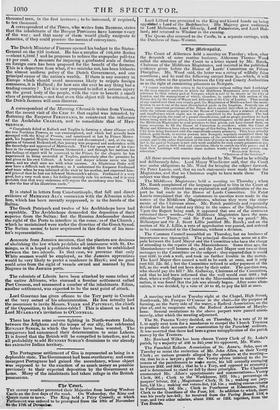Int IfittrupoTist.
The Court of Aldermen held a meeting on Tuesday ; when, after the despatch of some routine business, Alderman Thomas Wood called the attention of the Court to a letter signed by Mr. Botch,, Chairman of the Middlesex Magistrates, and inserted in the published evidence given before the House of Lords' Committee on Prison Discipline. Mr. Wood said, the letter was a string of wilfully false assertions ; and he read the following extract from it,—which, it will be seen, refers to the quarrel between the City and County Authorities as to the right of committing prisoners to Newgate. "I cannot conclude this return to the Committee without calling their Lordships' to the very singular position in which the Middlesex Magistrates were placed with reference to their county gaol of Newgate, which is said to be situate in the City of London, and the management of which, therefore. is. under the 13th section of the Prison Act, by the Court of Mayor and Aldermen of the City of London. Thus ousted of any control over their own county gaol, the Magistrates of Middlesex have the morti- fication to see it one of the most ilbconducted gaols in the kingdom. Scarcely one of the most important provisions of the Prison Act is carried into effect in that prison ; while the returns annually made to the house of Commons show a mixture of deceit and insufficiency which ought not to pass unnoticed by the Legislature. The bad state of the prison, the want of a proper classification, and no proper provision for hard labour being made in the prison, have caused an unwillingness on the part of many of the Middlesex Magistrates to send prisoners to that prison, and have caused them, on many occasions, to fill the house of Correction to overflow; while the Court of Mayor and Aldermen have taken advantage of this feeling, for many years, to save the City from being burdened with the unprofitable county prisoners. They have actually refused, point-blank, to receive persons into Neu gate, regularly committed there by County Magistrates ; to the great annoyance of the constables and all prudes con- cerned, and to the entire frustration of the ends of justice in more cases than one. Thee fact is, the gaol of Newgate is now only made available for such county prisoners as are, by the fees paid ou their trial and conviction, likely to enrich the City purse; and I trust their Lordships will consider these matters worthy of their most serious con- sideration." "BENJAMIN ROTCH,
"Chairman uf the Sessions."
All these assertions were again declared by Mr. Wood to be wilfully and deliberately false. Lord Mayor Winchester said, that the Court was under obligations to Mr. Wood for bringing the subject forward. Sir Peter Laurie, said, that no such statements were made before the Magistrates, and that no Chairman ought to have made them, The subject was then dropped.
The Middlesex Magistrates held a meeting on Thursday ; when Botch complained of the language applied to him in the Court of Aldermen. He entered into an explanation and justification of the re- port he had made to the House of Lords Committee. Sir Peter Laurie complained that the statements in question were made in the names of the Middlesex Magistrates, whereas they were the state- ments of the Chairman alone. Mr. Rotch positively and repeatedly denied that he had stated any thing in the names of the Magistrates. Upon the Report being read, it appeared that one of the sentences contained these words—" the Middlesex Magistrates have the mor- tification "—" There," said Sir Peter Laurie, " is my proof." Mr. Ballantyne and Sir J. Scott Lillie justified Mr. Botch ; and on the motion of Sir J. Lillie, a vote of approbation was passed, and ordered to be communicated to the Chairman, without a division.
The Common Council assembled on Thursday, but no business of
importance was transacted. The principal discussion arose on a dis- pute between the Lord Mayor and the Committee who have the charge of attending to the repairs of the Mansionhouse. Some time ago, the Mansionhouse-well became dry, and the Lord Mayor sent two or three messages to the Committee on the subject : they reported that it would cost 600/. to sink a well, and took no further trouble in the matter. The Lord Mayor then caused a well to be sunk at once, and it only cost 61/. 12s. 3d. ; but the Committee refused to order payment of the bill, as the work had not been done by their order. The question was, who should pay the bill ? Mr. Galloway, Chairman of the Committee, said that he had been informed that the well would cost 6001.; but that, when a well-digger was sent to the Mansionhouse to make exami- nation, it was found that the job was already begun. After some alter- cation, it was decided, by a vote of 50 to 46, to pay the bill at once.


























 Previous page
Previous page